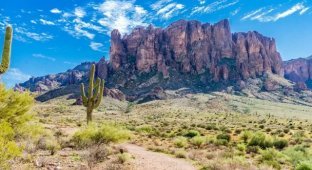How deserts bloom (26 photos)
Of course, some plants grow in the desert constantly, adapting and dodging, but sometimes these dry pieces of land show themselves in an unusual way, waiting for the rains and blooming to the surprise of everyone.
If you imagine the desert as a pile of sand or lifeless space, then this is not entirely true. Sometimes they come to life...
In addition to traditional sandy ones (as in Africa), there are clayey, rocky and saline semi-deserts and deserts. Naturally, depending on the type of soil, the fauna and especially the flora will vary significantly.

Atacama Desert
The Atacama Desert is considered the driest place on Earth. Flowers have grown there this week. The reason for this was the abnormal rainfall that hit the region in winter. Typically, the Atacama is covered with plants no more than once every seven years, but unexpected rainfall turned the arid area into a blooming garden five years ahead of schedule. Currently, more than 200 different species of flora can be observed in the desert.

Desert verbena is a prominent representative of the Atacama Desert. It is she who, after the rainy season, covers the entire space in a bright purple color

Verbena fields in Atacama

Ephemeroids are perennial herbaceous plants; they survive the dry season in the form of underground storage organs (tubers, bulbs) that are at rest. Leaves and reproductive organs above the surface of the earth develop in ephemeroids only for a short time - immediately after rainfall.

Blooming nolana


Blooming kermek (tumbleweed) in the Karakum Desert, Turkmenistan.
The Karakum desert is one of the hottest deserts located in the south of Central Asia, covering a significant part of Turkmenistan. In summer, daytime temperatures often exceed 50 degrees. On the ground, the heating is even greater - up to 80 degrees.

Common harmala, also called grave grass, wild, black and mountain rue, bibika, dog shit, pigan, splotnik, strelina, yuzerlik, yuzyurlyun. Poisonous desert plant

Cistanche saline (Broomrape)
Representatives of this species lack chlorophyll, the green pigment with which plants capture the energy of sunlight and carry out photosynthesis, and therefore they receive nutrition not as a result of photosynthesis, but from the cells of the host plant, to the roots of which they stick and take nutrients.

Arizona lupine in the Sonoran Desert, Arizona, USA
Sonora or Gila, one of the largest, is a sandy and rocky desert in the area of the US-Mexico border north of the Gulf of California. It has a relatively mild spring, with no extreme temperatures, although there is little rainfall. And once every 3-4 years the desert is covered with flowers.

Nolana and vervain

Wild lilies of the Sahara
The Sahara is the largest desert on the planet, located in northern Africa and stretches almost five thousand kilometers from the Atlantic to the Red Sea coast, covering the territory of ten countries. The Sahara is divided into several regions with different natural and climatic characteristics. Its dunes are the most visited place, and spring blooms attract even more tourists

Flowers of the Sahara - Salt marsh aster

Bitterweed (Saussurea)

Borschev's tulip is one of the most common plants in many deserts

Primrose in the Chihuahuan Desert, Texas, USA
The Chihuahuan Desert is located near the US-Mexico border. An arid plain cut through by mountain ranges with a mild climate. In early spring, when there is enough moisture in the soil and the sun is not so aggressive, primroses bloom here.

Foxtail lily (eremurus) in the Kyzylkum desert, Uzbekistan
Kyzylkum is a sandy desert between the Amu Darya and Syr Darya rivers in the territory of Uzbekistan, Kazakhstan and Turkmenistan. The soil here is scarce, but the Eremurus (desert candle), reaching 2 meters, feels at ease here.

Leafless cadaba Cadaba aphylla – xerophilic shrub - Kalahari plant
The Kalahari is a hot desert in Southern Africa, covering mainly Botswana, South Africa and Namibia, as well as Angola, Zimbabwe and Zambia. It is considered one of the hottest areas in this part of the continent.

At the beginning of the rainy season, which lasts from November to April, the spider lily blooms in the Kalahari. With the onset of drought, the plant goes into hibernation.

Ferula, a plant reaching 3 meters in height, Avicenna believed that regular use of this plant creates favorable conditions for restoring the body's defenses

Tamarix is a very elegant, low tree or spreading shrub from the Tamarix family. The thinnest branches are covered with many tiny multi-colored flowers, giving the crown of the plant an airy feel.

Wild garlic
The Gobi is a vast region in Central Asia, spanning Mongolia and China. There is relatively little vegetation in the Gobi, but wild garlic and Rota onions are very common

Roth's Bow

The Namib is a coastal desert in southwest Africa, the oldest on the planet; in the language of the Nama people, its name literally means “a place where there is nothing.” A huge part of the desert is bare rock and has no soil. In places where soil is present, it is highly saline and covered with a dense lime crust. There is very little rainfall here, but after rare rains, short grasses and rare flowers bloom in the empty ones.

Welwitschia amazing (Welwitschia mirabilis) amazing desert plant
This is a completely unique succulent that is unlike any other desert plant. It grows, spreading out on the sand its only pair of two-meter-long leaves, which the intense wind tears into pieces, intertwined into a single ball. Velvichias grow very slowly, and some are up to 2000 years old.
In the world you can count on one hand the lucky ones who have seen the amazing Welwitschia in all its glory in its natural environment - Welwitschia is considered one of the rarest plants in the world. It always grows alone; within a radius of hundreds of meters you will not find a single blade of grass. The special structure of its leaves helps Velvichia survive in the desert, each of which contains hundreds of stomata that absorb moisture from the air.






















